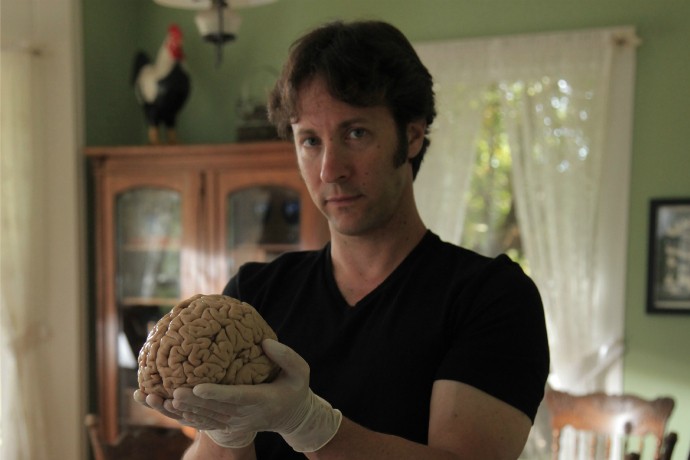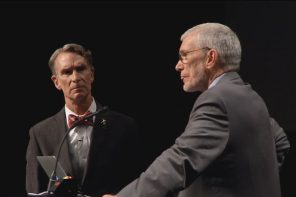When you get down to it, neuroscience is just brains studying brains. One upshot of this reflexivity is a funny kind of loop: studying the brain tells you about being a self; being a self offers up questions about the brain. More, perhaps, than participants in any other scientific field, neuroscientists can oscillate between the hard data of the physical world and the loftier questions of self and soul.
That kind of back-and-forth has been central to the career of David Eagleman, a neuroscientist at the Baylor College of Medicine. As an academic researcher, Eagleman has studied time perception, synesthesia, sensory input, and decision-making. But that more traditional work has included some less-than-traditional research techniques—Eagleman has dropped research subjects from a 150-foot-tall tower to study their time perception under duress—and some more wide-ranging intellectual explorations, including a popular study of the subconscious brain, a book about the internet, and an experimental novel, Sum, in which Eagleman imagines 40 possible versions of the afterlife.
This intellectual energy is on display in The Brain With Dr. David Eagleman, which premieres on PBS this week. Over the course of six hour-long episodes, Eagleman dives into issues of mind, identity, perception, and reality. Each episode is titled with a question: “What is reality?” “Who is in control?” “How do I decide”? What emerges is less authoritative tour than nod toward the unknown. Our experiences of reality are delicate, and conditioned by a brain that remains, to a large extent, unmapped: the terra incognita in our skulls.
Over the phone, Eagleman spoke with The Cubit about traumatic brain injuries, the idea of possibilianism, and the language we use to describe our brains.
This interview has been edited for clarity and length.
In The Brain, you do a good job of depicting the fragility of our experience of reality. Am I right to be a little scared by this instability?
[Laughs] Well, you know, it’s one of these things about knowing ourselves, right? We are so utterly dependent on the integrity of this three pounds of tissue in our skulls. When that changes, you change too. When it comes to these questions of who am I?, that’s got to be a part of our understanding. And yeah, it is a little scary, I agree.We have this illusion of continuity, that we are a single individual that lasts through time. This is, of course, the very natural intuition that led to ideas about an immortal soul. But in fact we’re completely tied in to what’s happening with our brains. Any sort of discussion about the soul or something at the center of us has to be integrated with this clinical knowledge.
Plenty of philosophers have critiqued our perception of the self as an autonomous, continuous thing. Is it different when it’s science making the point, instead of philosophy?
I think science and philosophy do and should go hand in hand. What the science gives are very clear, stark examples that are, for better or worse, unarguable. When you walk down any standard neurology ward, and you look at patient after patient—at people who have had a stroke or a tumor or a traumatic brain injury—what you see is that they’ve changed. They can change entirely: their decision-making, their risk aversion, their personality, their capacity to name animals or see colors or understand music. That clarifies the whole picture about the relationship that we have with our brains. Philosophical arguments are always subject to debate, but the scientific observations just are what they are.
You’re talking about the relationship that we have with our brains. Even in this conversation, we’re speaking of a self that’s distinct from the brain.
We’re linguistically limited. We don’t have, built in to our language, the right kind of tools to talk about this in a natural way. That reveals something even deeper, which is the strength of our intuitions about our conscious experience. I mean, it really feels like the you that wakes up in the morning is the one that’s in charge and driving the boat—and oh, by the way, you happen to own a spleen and a liver and lungs, and a brain also.
That’s such a powerful experience. Obviously our langauge just reflects that.
Neuroscience very quickly gets to these big questions: Who am I? What am I doing here? What is the self? Is there a soul? It seems to cut to these politically and culturally charged questions more than most other fields.
I feel very lucky about that, because if I were an expert in soil mechanics or something, my work would be important, but nobody would care about the questions I’m asking. What attracted me to this field is the centrality of the brain to our identities.
It’s interesting that you said that the questions it touches are charged. You’re right about that, and yet I hope in some circumstances that neurosciece will be exactly the thing to “uncharge” the question. If you can actually have a way of testing those questions, and coming to a conclusion, that releases the charge from the question.
Then it doesn’t have to be a hundred cultures raising swords against each other, because science is an international fellowship. This is one of the things that I love the most about science: in my lab or any lab, there are people there from all over the world. But they’re all there speaking exactly the same language. It’s a very clear set of rules about what flies and what doesn’t fly.
These are deep-seated cultural ideas about self and identity, though. I wonder if this is how evolutionary biologists were talking in, say, 1910, before evolution became such a full-blown cultural battleground.
I actually think one wouldn’t need neuroscience at all to notice some very basic things, such as that we all come to know and love and accept whatever our cultures pour into us. Part of the process of becoming a worldly adult is to recognize that, whatever you grow up with, you tend to think is the correct sort of answer.
You don’t have to be an anthropologist to realize that there’s not a blossoming of Islam in Springfield, Ohio, and there’s not a blossoming of Protestantism in Mecca. If there were one truth, you might expect that it would spread everywhere equally, but obviously it doesn’t. It’s all culturally conditioned.
It is the case that neuroscience is squarely in the middle of the arena in all these discussions, but I can imagine that a hundred years ago, before neuroscience was really a deal at all, it wouldn’t take much for one to realize the degree to which we’re culturally conditioned. That simple fact, I think, also discharges some of these questions.
So is neuroscience a way to codify that realization, or to understand it more deeply, or to give it context?
Part of what’s so stunning about neuroscience are the individual patient cases, where somebody gets a small amount of brain damage and it completely changes [some] aspect of their system of beliefs. Many people have had this in their family in one way or another, whether it’s their beloved grandparent who gets Alzheimer’s, or somebody that they know and love who gets a traumatic brain injury, or a tumor or a stroke.
It’s the more local version of what an anthropologist might realize: “Wow, we absorb our cultures.” What neuroscience offers is the closeup. “Okay, we absorb [knowledge] into our nervous systems, but boy, our nervous systems are fragile, and when they change a little bit, the identity changes with them.”
In the show, you emphasize the degree to which our experiences of reality are constructed inside our heads. But there are also these cultural or external ways to organize reality, too.
Einstein said that theory determines what we can see. What he meant, of course, is that when you step in any situation with some framework in your head, you’ll see certain details and you won’t see other details, because of what you’re looking for. Culture does this to us all the time: the things we notice, the ways we respond.
In terms of religion and cosmic belief, you’ve described yourself as a “possibilian.” What does that mean? How is that different from an atheist or an agnostic?
My personal view is that we know far too much at this particular moment in history to buy into the details of anybody’s particular religious story, and yet we know far too little to commit to a version of strict atheism, where we pretend like we have it all figured out, and that science gives us all the tools that we need to have a full understanding of what is going on in the enormous cosmos.
Possibilianism is an active exploration of different hypotheses. That’s what science is all about. The scientific temperament is a tolerance for holding multiple ideas in mind at the same time, and then gathering evidence to find support in favor of some of the ideas over others.
I just feel like the [question] Is there God or no God? is too limited for a modern discussion. My interest is in saying, “Well, how could we even get a sense of the structure of the possibility space, so that we can start trying to rule things in or out?” Sometimes what science does is open up new folds in the possibility space—new ideas that we hadn’t thought of.
The cosmos is so much more vast than we’re capable of wrapping our minds around, certainly in 2015, certainly in our brief lifetimes.
In Sum, you play these kind of cosmological games—what if an afterlike looked like this, or like this, or like this?
In some sense [Sum] is a possibilian manifesto. None of those stories were meant to be taken seriously, of course, but the serious part is the meta-message of the book, which is, “Hey, you know what, we can start shining a flashlight around this possibility space.” If I can sit down and make up 40 completely different versions [of the afterlife], then we could, as a community, make up many hundreds and thousands of versions of what might be going on. The important part is the exploration, instead of the pretense to certainty.
You have this philosophical commitment to possibility. But there are people trying to get specific moral messages out of neuroscience, too—specific statements about how we should live, how we should blame, and so forth. Is that going too far, or can these conclusions coexist with that openness to possibility?
I actually think it’s extremely important to figure out what we can learn, including in terms of morality and social policy, from neuroscience. I direct the Initiative on Neuroscience and Law, about the intersection of what happens with criminal justice and what we know from neuroscience.
Just as a quick example, one issue is our prison population has quadrulpled in this country, almost entirely because of the war on drugs. The issue about drug addiction is that the War on Drugs has always been attacking drug supply, but if you really want to have an impact on people whose lives are getting ruined by drugs, you have to understand drug demand, not supply, and that’s the brain of the addict.
There are [other] issues about juveniles and how you punish juveniles—their brains are really plastic. I think that it’s actually very important to leverage what we know in neuroscience to crafting social policy that’s more aligned with testable evidence.
Also on The Cubit: Why Science Needs Neurodiversity





